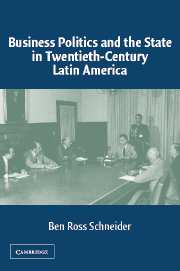Book contents
- Frontmatter
- Contents
- List of Tables
- List of Abbreviations
- Acknowledgments
- PART I INTRODUCTION AND ARGUMENTS
- PART II CASES AND COMPARISONS
- PART III IMPLICATIONS AND CONCLUSIONS
- 8 Economic Governance and Varieties of Capitalism
- 9 Democracy and Varieties of Civil Society
- Appendix A Background Information on Major Business Associations
- Appendix B Interviews
- Appendix C Conversions
- References
- Index
9 - Democracy and Varieties of Civil Society
Published online by Cambridge University Press: 23 November 2009
- Frontmatter
- Contents
- List of Tables
- List of Abbreviations
- Acknowledgments
- PART I INTRODUCTION AND ARGUMENTS
- PART II CASES AND COMPARISONS
- PART III IMPLICATIONS AND CONCLUSIONS
- 8 Economic Governance and Varieties of Capitalism
- 9 Democracy and Varieties of Civil Society
- Appendix A Background Information on Major Business Associations
- Appendix B Interviews
- Appendix C Conversions
- References
- Index
Summary
An association for political, commercial, or manufacturing purposes, or even for those of science and literature, is a powerful and enlightened member of the community, which cannot be disposed of at pleasure or oppressed without remonstrance, and which, by defending its own rights against the encroachment of the Government, saves the common liberties of the country.
Alexis de TocquevilleWhere the state is the only environment in which we can live communal lives, they inevitably lose contact, become detached, and thus society disintegrates. A nation can be maintained only if, between the state and the individual, there is intercalated a whole series of secondary groups near enough to the individual to attract them strongly in their spheres of action and drag them in this way into the general torrent of social life.
Emile DurkheimBusiness Associations and Democracy: A Checkered Past
At least since the time of Barrington Moore's (1966, 418) dictum, “no bourgeois, no democracy,” contemporary social scientists have debated whether business is fundamentally a force for or against democracy (Bellin 2000; Durand and Silva 1998; Haggard and Kaufman 1995; Payne 1994; Rueschemeyer et al. 1992). My research addresses this debate but only obliquely, since it focuses more on the form of business politics, organized or not, than on the content. Nonetheless, focusing only on the dimension of organization, the question can be posed: does stronger organization tend to make business more democratic? This question can be further specified in three subquestions, two historical and one contemporary.
- Type
- Chapter
- Information
- Publisher: Cambridge University PressPrint publication year: 2004



